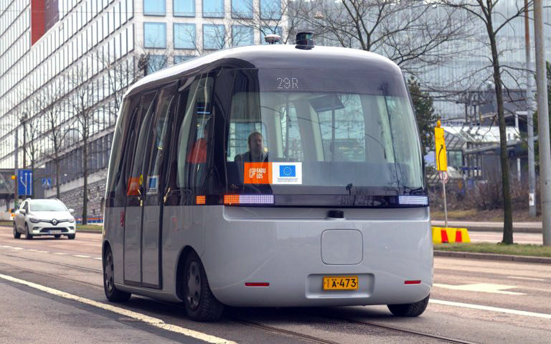Robot buses go live in European cities
- June 9, 2020
- Steve Rogerson

After 18 months of developing autonomous shuttles, the Fabulos project is bringing robot buses to the streets of Europe. From this spring, three robot bus prototypes will be evaluated in real-life conditions in five European cities.
All the shuttles offer an all-inclusive service for autonomous last-kilometre transport. The trials will test their features and look at how they adapt to geographical challenges.
During field-testing before commercial procurement, the robot bus prototypes will be tested as small fleets of shuttles in Estonia, Finland, Greece, Netherlands and Norway. Each of the three suppliers chosen for this phase receives up to €1m to prepare pilots and implement operational systems to validate their prototypes.
The three supplier consortia, composed of several companies representing five nationalities, are Sensible4-Shotl (Finnish–Spanish), Saga (Norwegian–Canadian) and Mobile Civitatem (Estonian).
Though Fabulos is not a vehicle procurement project, it takes a systematic approach. Therefore, the focus is on a turnkey model that can manage automated robot bus fleets as part of cities’ public transportation systems. For cities, this means more attractive, cost-efficient and sustainable transport. Citizens, in turn, get more tailored urban mobility alternatives, enabling seamless transfer across the public transportation network.
The piloting of the self-driving shuttles has already started in Helsinki, Finland.
“Helsinki aims to be the most functional city in the world,” said Jan Vapaavuori, mayor of Helsinki. “Innovation to support the best urban life conditions possible is in the core of our strategy. As such, the promotion of sustainable modes of transport is considered as a high priority. We aim for a pleasant environment, good accessibility and fluent transport as well as the reduction of environmental impacts. In my opinion, the Fabulos project can greatly contribute to achieving this goal by demonstrating the benefits of autonomous public transportation.”
Pilots in Gjesdal (Norway) and Tallinn (Estonia) are due to start this month, but there might be some delays due to Covid-19 restrictions. During autumn 2020, pilots will be launched in Lamia (Greece), Helmond (Netherlands) and again in Gjesdal. Each of the suppliers will pilot their robot buses in two cities.
As part of each 50-day field trial, the functionality, interoperability and security of the autonomous fleets will be assessed. After each of the pilots, representatives of the six Fabulos procuring partners will carry out an evaluation process. A pre-commercial procurement does not have one winner: all robot bus prototypes are expected to be commercialised and can be part of a follow-up procurement.
The first pilot was launched in April in Helsinki. The fleet of three autonomous vehicles, including the Gacha robot bus, drives along a circular route starting from the busy Pasila Railway Station, riding partly on a separate lane, with speeds of up to 40km/h. Most of the route is in mixed traffic and includes several crossroads with traffic lights, right turns, street-side parking and a roundabout. There are three bus stops on the route and on-demand rides are available via a mobile app.
Technologically, the shuttle buses do not need a driver or steward on board since they can operate fully autonomously. For the first time in Europe, the fleets are monitored from a recently established remote control centre. In exceptional situations, a remote operator can give permission to pass an object, such as a car blocking the road, or take over the control of the vehicles.
The overall aim of the Fabulos pre-commercial procurement is to accelerate the introduction of new types of automated last-kilometre transport entering the European market. Therefore, when the pilots are finalised, the procuring cities and any third-party procurers will consider initiating a public follow-up procurement in 2021 based on the insights gained from the project.




